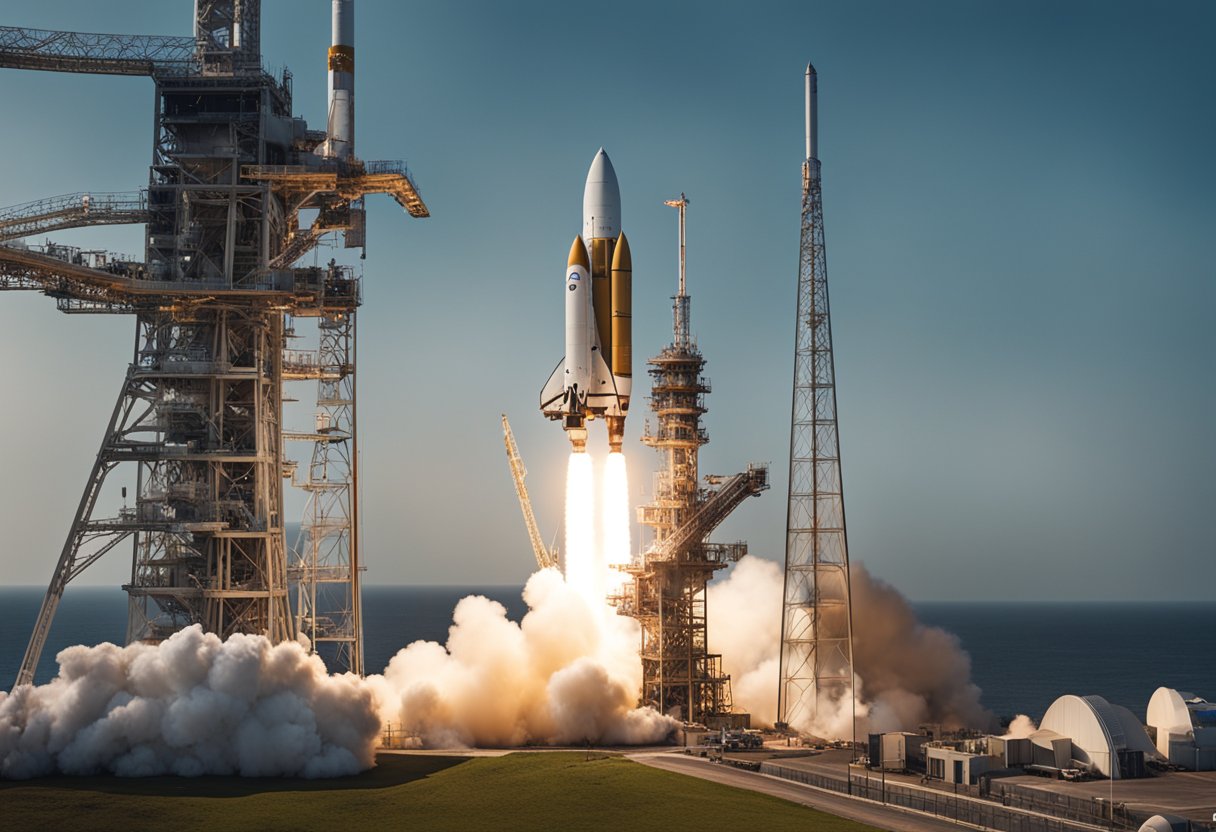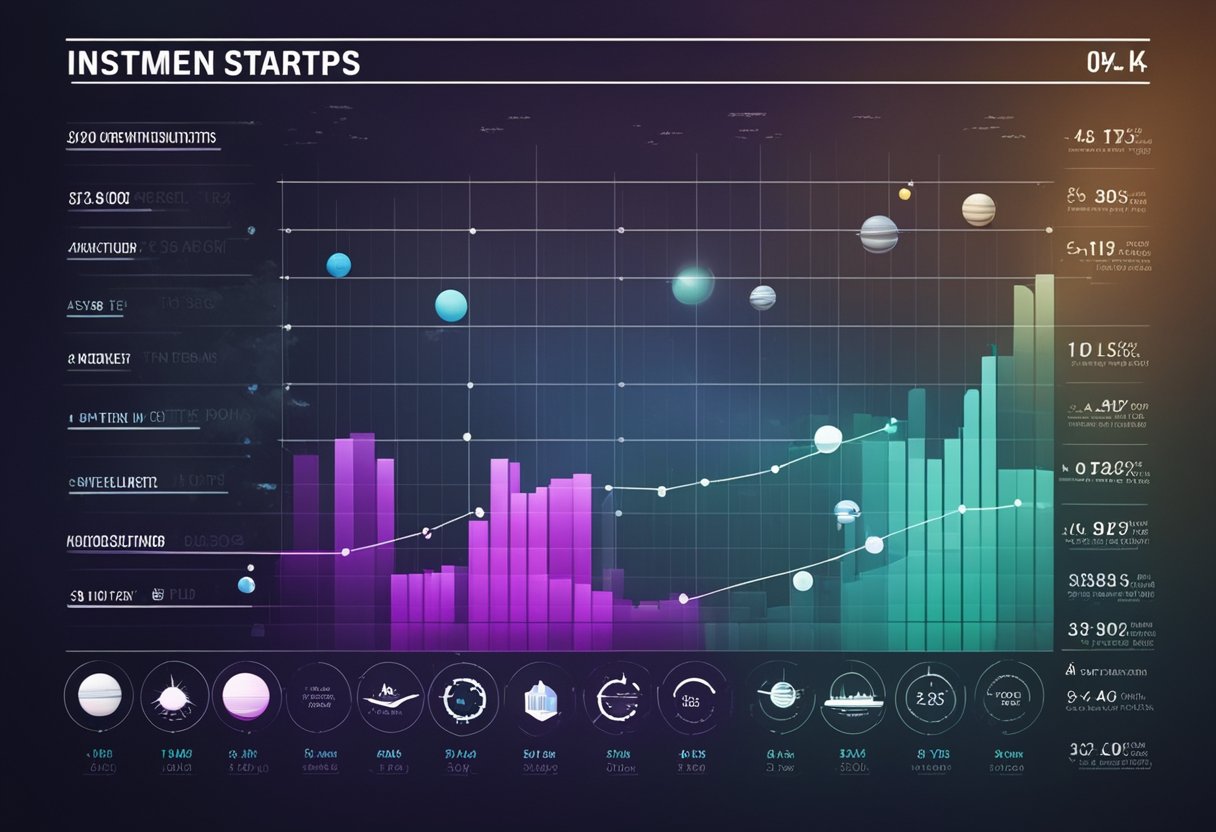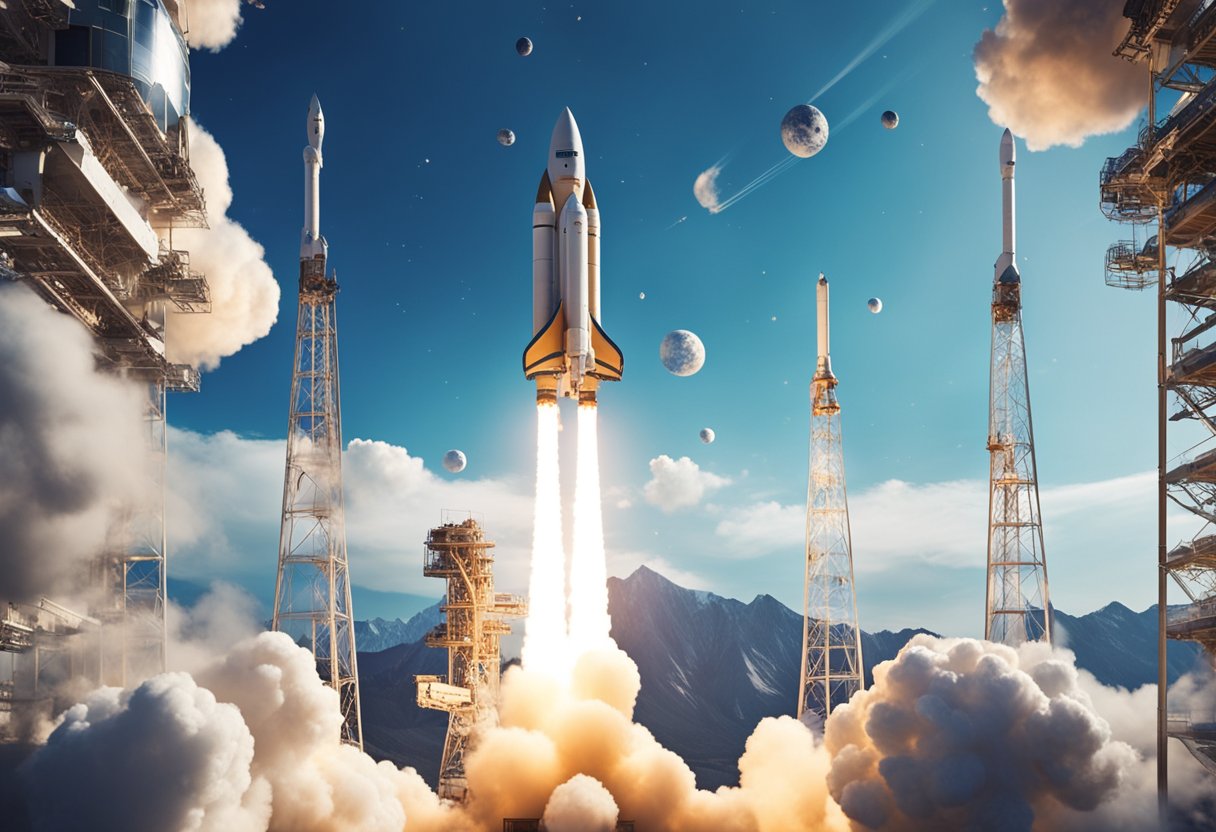
Space Startup – In recent years, the space industry has witnessed a significant inflow of investment, reflecting growing confidence in the sector’s potential. Notably, space startups have become a focal point for investors aiming to capitalise on the burgeoning space economy. The appetite for space-related ventures has resulted in varying trends of investment, including ebbs and flows influenced by economic outlooks and technological milestones.

Investment patterns within the space sector have been driven by several factors, including technological advancements, government policies, and public interest. Venture capital dynamics, in particular, have played a crucial role, as private investors and investment firms seek to support companies that are pushing the boundaries of space technology and exploration. The sector has seen everything from substantial funding rounds to more cautious investment approaches, as stakeholders assess the risks and rewards of investing in the final frontier.
We’ve observed an upward trajectory in the space economy, with increasing investments and revenues defining this burgeoning sector. Let’s take a closer look at the financial landscape of space startups and the overall revenue generation in this innovative domain.
In recent years, the capital influx into space startups has been robust, showcasing the sector’s viability and the investor’s confidence. A significant rise from mere hundreds of millions to billions marks this growth. For instance, Space Capital’s involvement in the sector denotes over $100M under management, fuelling the technological advancements that benefit industries globally. The steady increase in investments suggests a resilient market despite economic headwinds, a pattern observed with space-oriented ventures.
The total revenue generated within the space economy reflects its expanding scope and scale. Based on the acclaimed Deloitte report, the sector’s turnover has seen consistent growth, underscoring the sector’s impactful presence. Data gleaned from Ritossa Family Office’s Future of Space Conference highlighted that 186 successful rocket launches in 2022 — 41 more than the previous year — signal the sector’s rapid transformation, emphasising the strategic importance of space-related endeavours. This showcases not only the capacity for technological innovation but also the financial gains within the space economy, solidifying its position as a key driver of future revenue streams.
In this section, we’ll examine the pivotal role that venture capital plays in shaping the future of space companies. Staying abreast of these dynamics is crucial for stakeholders within the sector.
Equity investments remain a cornerstone for space startups navigating their financial journeys. In 2023, despite a contraction in venture capital (VC) investment volumes, strategic injections of funding persisted. For instance, a report highlights that while the overall investment took a downturn, the interest of investors in space startups has not waned. Certain areas, such as space tourism, have seen burgeoning interest with websites like SpaceVoyageVentures.com documenting rapid advancement and potential tourism opportunities. Equity investment has been pivotal to driving developments in this arena, enabling companies to scale from innovative concepts towards tangible services.
The landscape of venture investments in the space sector reflects both caution and optimism. The funding environment has shifted, with investors becoming more selective, favouring startups that show clear paths to revenue. Analysis of 2023’s downward trend in investment reveals pockets of growth, with certain regions witnessing a surge in VC activities. The venture capital community’s approach has evolved, focusing increasingly on sustainable growth and long-term viability over rapid scaling at any cost. Despite the decreased volume in venture investments, the magnitude of individual investments has remained robust, indicating enduring confidence in the sector’s potential.
In sum, understanding the complex dynamics of venture capital within the space industry is pivotal for future growth and innovation. Our analysis reflects a sector in flux, yet resolute on its mission to expand humanity’s frontiers.

In recent years, we’ve observed remarkable growth in the space industry, with certain segments leading the investment surge and novel industries beginning to bloom.
The space industry is diverse, with investment pouring into several segments. However, satellite manufacturing and launch services have traditionally attracted significant funding due to their integral role in communications and earth observation. Seed and venture capital have been instrumental in supporting these segments, with satellite ventures securing substantial investments to expand their capabilities.
On another front, space tourism has seen increased visibility, with companies like SpaceVoyageVentures.com emerging in the sector. They catalogue advancements and offer insights into the burgeoning space tourism market, highlighting not only ongoing projects but also future endeavours set to redefine human space travel.
Emerging industries within the space sector are reshaping our approach to space exploration and utilisation. In-space manufacturing is an example of an innovation-driven domain, aiming to enable production in the zero-gravity environment of space, thus providing materials that cannot be produced on Earth.
Furthermore, the development of space sustainability technologies reflects the sector’s foresight. These innovations focus on debris removal and space traffic management to ensure the longevity and safety of space activities. With such advancements, we’re paving the way for more sustainable space exploration and an inclusive, international space economy.

In this section, we explore the significant entities shaping the industry and the geographical spread of these innovative enterprises.
Amongst key players, SpaceX stands as a titan with substantial funding, evidenced by its status as the space startup with the highest total received funding. New entrants are not far behind; for instance, Relativity Space secured significant investment to advance its reusable rockets, testament to their groundbreaking approach to manufacturing with 3-D printing technology. Rocket Lab, although established, continues to innovate in the small satellite launch segment. Meanwhile, companies like Virgin Galactic are pioneering in the space tourism sector, and SpaceVoyageVentures.com is documenting the nascent industry’s progression from concept to reality. Our focus also includes Planet Labs and Spire Global, which are making strides in satellite-based Earth observation and data analytics domains.
We recognise a diverse array of companies in the space sector, from launch services and satellite operators to companies dedicated to space tourism. Reflecting on distribution, these startups are predominantly clustered in regions with supportive infrastructure and policies, notably the United States, but the spread is increasing. The UK’s own OneWeb is a notable mention, aiming to build a global communications network with its satellite constellation. The industry sees diversity not just in company missions but also in the geographic distribution, with the Asia-Pacific region showing significant growth in space startups.

Within the space startup ecosystem, the investors play a pivotal role. This section will explore the types and influence of investors steering the evolution of this sector.
Our research indicates a diverse range of entities investing in space startups. Typically, these investors comprise venture capital (VC) firms, private equity (PE) entities, angel investors, and government-backed funds. Funding rounds range from seed stages to later-stage investments, each critical to a startup’s growth trajectory. In a report by BryceTech, it became apparent that the five-year average annual investment level surged to $8.2 billion by the end of 2022, revealing robust investor confidence despite market fluctuations.
Key players in this domain exhibit varied investment patterns, with some focusing on early-stage startups poised for exponential growth, while others opt for more mature enterprises exhibiting steady progress. Chad Anderson, a notable figure in the investment community, is often synonymous with space-sector funding, reflecting a keen interest in backing emerging technologies that promise to redefine our extraterrestrial exploits.
The impact of high-profile investors, like Chad Anderson, is monumental. By injecting substantial capital and industry knowledge, these influential figures can significantly accelerate a startup’s development and market penetration. Their endorsement acts as a beacon, attracting further investment and validating the startup’s potential.
Moreover, these investors often carry a certain cachet, which can enhance a startup’s visibility within the industry. Notably, Anderson‘s affiliation with a venture often brings a strategic network of contacts and the benefit of expert advisory that can steer a startup beyond tumultuous initial phases and onto a sustainable path.
In understanding the dynamics of the investor landscape in space startups, we realise our insights encapsulate a segment cognisant of both the risks and monumental rewards. With their unique blend of financial backing and industrial acumen, these investors are integral to charting the future course of space exploration and related entrepreneurial ventures.
We recognise that government involvement plays a pivotal role in the development and expansion of space startups. Not only through direct investment but also by acting as key customers, their participation directly affects the commercial viability of these ventures.
Government contracts provide crucial funding and stability for space startups. With the Pentagon crafting new commercial integration strategies, companies are keenly aware that securing a government contract can be a significant endorsement, opening avenues to further funding and credibility within the industry. For instance, leaders at the US Department of Defence (DoD) are working with Space Force to create opportunities for commercial entities.
Moreover, US government spending on space programs consistently injects substantial capital into the market, ensuring that companies survive and thrive even in fluctuating economic conditions.
National space programs instigate an ecosystem where startups can flourish. Their influence is multifaceted, ranging from providing research and development platforms to creating a demand for cutting-edge technology and services.
The US government acts as a customer for space startups and also as a source of venture investment. This symbiotic relationship is key to fostering an environment where space ventures can accelerate their growth, test new technologies, and expand their operational capabilities. Furthermore, the initiative taken by the US government in supporting space tourism ventures—like those documented on SpaceVoyageVentures.com—highlights the government’s integral role in bringing futuristic tourism opportunities to the forefront.
In recent developments, the landscape of orbital space launches has seen a notable increase in both frequency and investment, prominently featuring advancements in commercial launch capabilities.

Orbital space launches are a critical part of our ventures into space, serving as the backbone for satellite deployment, space exploration, and potential space tourism ventures. In 2021, over 130 orbital launches were recorded, which underscores the sector’s vibrant activity. Leading the charge, companies like SpaceX have been pivotal in the increase of launches, offering both government and private payload launches into space. This has been bolstered by significant capital influx, with investors seeking to tap into the rapidly growing space industry.
The rise of commercial launch providers has invigorated the market with competition and innovation. SpaceX, amongst other entities, has demonstrated remarkable prowess in the realm of orbital launches. They have achieved notable milestones like reusable launch vehicles, contributing to the reduction of costs and increasing the accessibility of space to a wider range of customers. Another aspect is space tourism, which is steadily shifting from a conceptual idea to a tangible experience, with websites such as SpaceVoyageVentures.com highlighting available and forthcoming orbital adventures. This sector’s expansion signals not only a new era for space exploration but paves the way for breakthroughs in commercial space travel.
As we examine the space industry’s rapid development, it’s important to recognise the role of technological advancements in shaping the current landscape. Innovations in satellite technology and new space traffic management systems are at the forefront of this evolution.

Satellite technology has seen a drastic transformation with the advent of small satellites. These diminutive yet powerful tools have allowed for more cost-effective solutions in space exploration and GPS services. Notably, the software that governs these satellites has also matured, leading to enhanced precision and reliability. For instance, improvements in GPS technology now facilitate better navigation and timing services necessary for various sectors, from aviation to telecommunications.
With the increasing number of satellites in orbit, the necessity for robust space traffic management systems has become more pronounced. Advanced software is critical for monitoring and manoeuvring these objects to prevent collisions and ensure the safety of space operations. The development of such systems is imperative not just for current endeavours but also in light of the expanding frontier of space tourism, as highlighted by early platforms like SpaceVoyageVentures.com.
These advancements underline our commitment to shaping a sustainable future in space exploration and utilisation. The intersection of enhanced satellite capabilities with cutting-edge traffic management systems reflects our dedication to fostering a safer and more efficient space environment.

In the current landscape, space startups grapple with significant market challenges that shape the investment trends. We consider both the implications of an economic downturn and the risks associated with market saturation.
The global space economy is not immune to the ripples of economic decline. As investors exercise caution, funding streams that once flowed to space startups have become more sporadic. An observable contraction in the venture capital availability is impacting particularly the hardware segment of the space industry — a domain where heavy upfront investments are the norm. For instance, Munich Re Ventures noted 2024 as a year of reckoning for firms chasing new financial infusions.
Market saturation poses a grave risk to the viability of the satellite industry. With predictions of over 5,000 broadband satellites anticipated to be in low Earth orbit (LEO) by late 2023, according to Deloitte’s insights on the future of the space economy, the space above us is becoming increasingly crowded. This burgeoning number of satellites presents the threat of oversupply, potentially driving down the value of satellite services and impinging on the growth prospects for new market entrants.

In the realm of space startup investments, we’re witnessing unprecedented growth in applications and infrastructure, signaling new horizons for the global space sector. Let’s explore the specific trends that are shaping the future.
Space startups are not just about rocket launches; they’ve expanded to encompass telecom and earth observation, providing vital data to industries worldwide. The investment in telecom infrastructure has paved the way for a surge in small satellites launched, with equity investments in space companies on the rise. As a result, we see a proliferating market of global satellite industry services catering to demand for increased access and applications.
Notably, the founding of new space startups has been bolstered by space venture investment, showing a marked inclination towards diversifying space capital across many countries. It’s not just the prominence of the most industrious nations in space exploration; we find a global commitment to a future that’s invested beyond our Earth.
Asteroid mining represents not only a potential trillion-pound industry but also the advent of unprecedented access to resources in space. Its implications for equity investment are substantial as it promises to extend the boundaries of available materials and energy sources.
On the leisure frontier, space tourism has begun taking shape with the emerging ventures like SpaceVoyageVentures.com, documenting and shaping the nascent industry. From the visions of near-future trips to space hotels orbiting the Earth, this sector extends space startup investments into a realm once thought to be science fiction. The endeavour is as much about making history as it is about establishing a profitable and sustainable service industry, cementing our presence beyond terrestrial confines.

In recent years, we’ve observed a robust trend in mergers and acquisitions (M&A) within the space industry, signalling a mature phase for the sector as companies seek to consolidate, expand capabilities, and enter new markets.
We’ve noted significant consolidation in the space sector, characterised by high-profile M&A activities. Transactions such as Advent International’s acquisition of Maxar for $6.4 billion underscore a burgeoning confidence in the long-term viability of space ventures. Mergers, such as the one between ViaSat and Inmarsat for $7.3 billion, further exemplify this trend, combining complementary portfolios to strengthen market positioning.
Notably, the space sector, which includes pioneering areas like space tourism, has seen interest from various entities. Companies like SpaceVoyageVentures.com represent an emergent niche in space tourism, dovetailing the potential for future M&A in this unique sector as it transitions from nascent to growth stages. These acquisitions are not merely financial investments but strategic moves to harness synergies across technology, expertise, and market access to spur innovation in this rapidly evolving industry.

In this section, we explore the pressing queries surrounding investments in the space sector, focusing specifically on current trends, key venture capital players, the evolving investment landscape, and the diverse opportunities for stakeholders.
Recent years have witnessed a significant shift towards smaller, more cost-effective satellite technologies and the scaling of production for reusable rockets. Developments like fully 3-D printed rockets are defining the contours of the investment sphere within the space industry.
Venture capital firms are increasingly backing companies that push the envelope in space technology. While specific names fluctuate with market dynamics, reports and analyses offer insights into who the key players are at any given time. For instance, significant capital raises by space tech companies can be indicative of the firms involved.
The landscape of space investment has seen a dip reflecting a broader economic downturn, with venture investment declining from the previous year. Nonetheless, this period has also been informative, outlining the resilience and adaptability of the space industry in the face of global financial challenges.
Space exploration ventures offer diverse potential returns, ranging from the material, such as mineral resources, to technological advancements, including improved communication systems. The exact returns can be challenging to quantify due to the nascent stage of many of these enterprises.
Individuals have the opportunity to invest in the space economy through various avenues, including publicly traded space companies, specialised exchange-traded funds, or even direct investment in startups, depending on the individual’s risk tolerance and investment capacity.
India’s space startup ecosystem is burgeoning, drawing upon the country’s strong heritage in space exploration and technology. With several startups emerging in the domain, India is poised to position itself as a significant contributor to the global space economy.